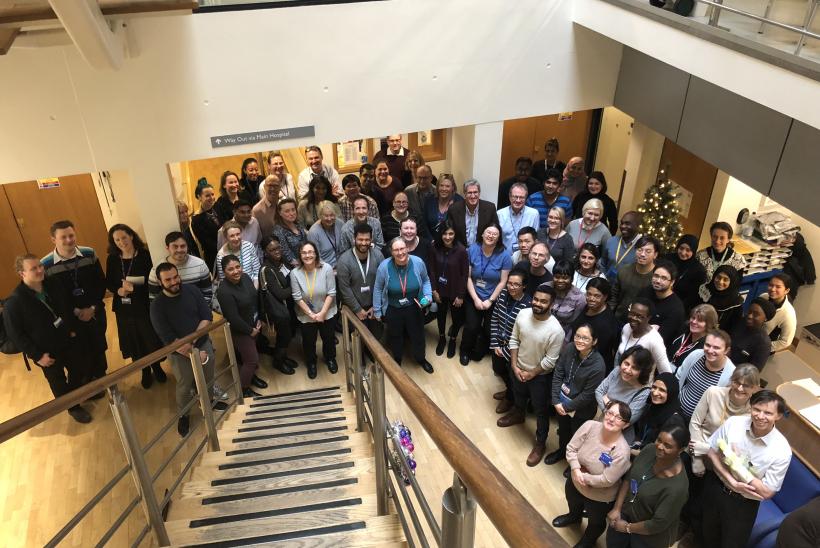A Day in the Life of a Biomedical Scientist at GOSH
Great Ormond Street Hospital for Children (GOSH) has a strong history in developing and supporting diagnostic and clinical innovation and offers a range of unique laboratory services covering both routine and specialist testing. Today, three Biomedical Scientists from different laboratories at GOSH share their typical day and the importance of their work at GOSH.
Meet Christopher Connor from Flow Cytometry Laboratory –SIHMDS/HAEM
‘In my view, a biomedical scientist (BMS) is a trained professional who is committed to using their analytical skills and scientific knowledge to support the diagnosis and treatment of disease.’ Chris said. ‘I am a specialist BMS working in the Flow Cytometry laboratory in the SIHMDS/Haem department of the Camelia Botnar labs at GOSH. Our small team tests multiple sample types to diagnose haematological diseases including leukaemia and lymphoma and solid malignancies such as neuroblastoma. We also provide tests for red blood cell and platelet abnormalities and participate in various research projects and clinical trials’.
He also added, ‘What we do is very significant to GOSH because, without the results we provide, doctors would not be able to diagnose children with leukaemia and other diseases. Also, the information that we supply to medical staff allows them to ensure that the child is receiving the correct treatment for their disease, carefully monitor how the child is responding to this treatment and adjust this treatment if necessary. I have been at GOSH for over a year now and find the job both challenging and rewarding. I am proud to be employed by such a world-renowned hospital that really makes a difference to children and their families.’
Meet Naghman Hussain from Chemical Pathology, Enzymes Unit
‘As I work in enzymes lab mostly, my assays consist of mixing a blood sample with a substrate and incubate them in optimum conditions. The conditions I need to consider are temperature or pH that the sample will incubate at and for how long. I also need to consider what volume of the sample I shall use or what the concentration of the substrates should be. To measure the maximum enzyme catalytic activity, it is essential that all active sites are saturated with substrate. This is assessed when assays are set up in the lab with enzyme kinetic studies. Predominantly enzymatic assays need incubations between 30 minutes to 2 hours, but some needs up to 20 hours. During the incubation, I maintain the analysers or machines which read the results to ensure the analysers are working in order and they are good to use.’
Naghman discusses his typical day in the enzymes lab at GOSH. ‘I usually spend my afternoon stopping the test with suitable stop buffer and analysing the patients’ samples on the analyser with quality controls and standards. This ensures the test is working correctly and consistently. Moreover, I record the results on the worksheets and manually calculate enzyme activity for each sample. This enzyme activity is used for diagnostic and treatment purposes. I always double check my calculations to minimise the human error. When I am happy with the results and confident they are analytically correct and can be used for medical purposes, I enter the results into the computer, so a clinical scientist can authorise these results. I also record the results of quality controls and standards, which is linked to maintaining the schedule and the quality management systems. It is very important that these results are correct and accurate because doctors rely on these results to diagnose and treat the patients. Therefore, it is my utmost duty to perform the test correctly and ensure the results produced are analytically correct.’
Meet Lisa Mennie from Metabolic Laboratory
‘I am a Senior Biomedical Scientist, working in the Metabolic Laboratory within the Chemical Pathology Department at GOSH.’ Lisa Mennie continues ‘Every day I assist clinicians to investigate what is happening inside the body by performing complex tests on patient samples such as blood urine and faeces. Over 70% of diagnosis, monitoring and screening decisions are based on results provided by biomedical scientists. GOSH provides a wide range of specialist care for children, and so the unique tests, knowledge, and experience provided by our services are required to underpin that care.
The Metabolic Laboratory investigates patients with suspected and known inborn errors of metabolism; when bodily processes go wrong, such as Maple Syrup Urine Disease. MSUD patients are on a specialist diet because they cannot breakdown certain amino acids (the "building blocks" of protein), causing a harmful build-up of substances in the blood. Frequent monitoring helps to maintain a healthy level of these amino acids without causing harm. Patients send in a blood spot card to the lab for testing. I will run this test daily on several MSUD patients and report the levels of amino acids to the patient’s dietician who will amend the diet accordingly.
Other tests produce a lot of data; I can be looking at 26 amino acids in plasma and more than 100 organic acids in urine from one patient. With urgent cases, it can be all hands-on deck to get results out the next day, especially if a single test can take a whole day to run! It's stressful, but extremely rewarding, knowing I’m helping to care for patients. I love my job and feel proud to be a Biomedical Scientist.’


